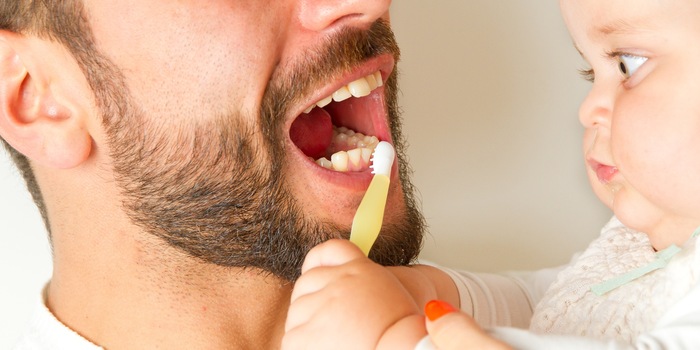
How do I brush my teeth properly? An expert can tell you
It's important to learn how to brush your teeth properly. Dr Marc Frei, a dentist practising in Berne, shows you the brushing techniques you can use on yourself or your children. He also gives a few tips on how to make it easier for toddlers to clean their teeth.
Brushing in adults
Teeth must be cleaned after each meal. While brushing technique and the choice of a manual or electric toothbrush are important points, the main thing is to make sure you brush your teeth at least once a day, and to brush carefully, without forgetting the inside of the teeth. Opt for a brushing system and get advice from your dentist or dental hygienist; they'll show you a technique that's right for you.
The correct brushing technique in detail:
Tooth brushing system (manual and sonic electric toothbrushes)
Fluoride protects teeth
You can use a manual toothbrush or an electric toothbrush, useful for those who are in a hurry, find it hard to concentrate on brushing or have limited physical ability.
If you use a manual toothbrush, make sure it has soft bristles. Change your toothbrush at least every two months. The tip of electric models should also be replaced regularly.
Don't forget to clean the interdental spaces using various accessories. Let your dentist or dental hygienist advise you; he or she will tell you which one to use.
The use of an interdental cleaner is a good idea.
The use of fluoridated toothpaste and the consumption of fluoridated cooking salt form the basis of good dental prophylaxis. Other prophylactic measures are only used where there is a high risk of dental disease and are prescribed by a dentist.
Spit out the toothpaste after each brushing and rinse your mouth with a little water.
Brushing in young children
Young children's teeth should be cleaned at least once a day as soon as the first milk teeth have come through.
Use a children's soft-bristled toothbrush and the equivalent of a pea-sized amount of children's fluoride toothpaste. Switch to a toothpaste with a "normal" fluoride content as soon as the first permanent teeth appear. As well as using fluoride toothpaste exclusively for children, season your dishes with fluoride cooking salt.
Don't let your children brush their own teeth at first. They can do it when they're a bit older, but brush behind them at least once a day until they're 8 years old.
The brushing method, which consists of cleaning the chewing surface first, then the outer surfaces, and finally the inner surfaces, is to be preferred so that no dental surface is missed.
It is important to brush the teeth of children over the age of 12 months at least twice a day.
The first visit to the dentist can take place as early as 2 years of age. Bring your child along for your own dental check-up, for example.
What should you do if your child won't let you brush their teeth?
Here are a few tips:
- Brush each other's teeth.
- Ask her big brother or sister to show her how.
- Brush the teeth of your child's favourite stuffed toy first.
- Make brushing part of the bedtime ritual, for example before singing songs or reading stories.Try using two brushes at the same time. - Try using two toothbrushes at the same time, one for you and one for your child.
- You can also try out an electric toothbrush if your child is over three years old.
- There are many smartphone apps or picture books on the subject.
Specialist Dentist for Oral Surgery SSO with a Master of Advanced Studies in Oral and Implant Surgery, University of Bern (MAS ORALSURG and IMPSURG Unibe) Dr. med. dent. Frei runs a practice in Berne, is an affiliated doctor at the Hirslanden Clinic Permanence, external senior physician at the Clinic for Oral Surgery and Stomatology of the University of Berne, dental supervisor at SC Berne and head of ITI Study Club Berne 2.
Interesting facts about products, behind-the-scenes looks at manufacturers and deep-dives on interesting people.
Show all